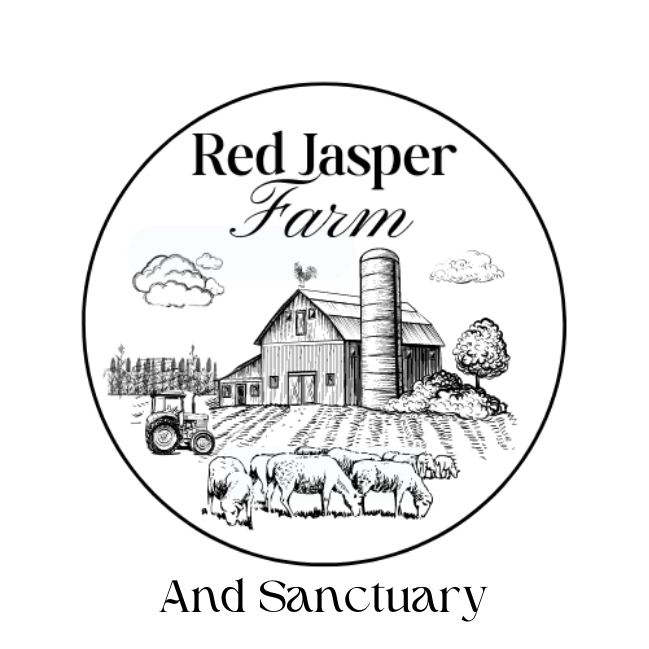Happy (belated) Farm Animal day
April 10 was national farm animals day. Today we're going to tell you our residents’ stories and their roles in our mission.
Author: Arloa Chadwick
Our Chickens:
The chickens are a big help at Red Jasper. They till and fertilize soil, keep down pests, provide a surplus of eggs, and provide companionship. They have room to roam and be free, to forage for nutrients, and to form bonds with their fellow flock mates - as it should be. The chickens lead opposite lives to those of factory farmed hens, who are confined to a small pen, and often don’t get to see outside. Unlike some, we also keep our roosters, who help protect the hens, contribute to bug control, fertilize the area and add peaceful ey noises to the farm! The Red Jasper Chickens’ mission is to show people that chickens are beings too, and that better, more sustainable, animal welfare centered agriculture is possible. Together they’re helping us and our mission out, one egg at a time.
The Guinea Fowl
These rarely heard of fowl originate from Africa, but we use them over here at Red Jasper for natural insect control (Guineas are slightly better at it than chickens). Our guineas produce eggs, but since they don’t use nesting boxes because of their wild, untamed instincts, we don’t harvest their them. It’s no use trying to find their eggs in 36 acres! But they are amazing bug control, a good alarm system, and guineas have even been known to protect properties. While they aren’t the most active in our mission, they do help out by letting us know when something is up, and keeping down bugs.
The Sheep
The sheep have a complex story. Years ago when we bought the property, the sheep came with it. Back then, we were a meat raising farm, but after a few years decided against it. So nowadays the sheep just roam their pasture, but they still do help us out somewhat. Just like the chickens and guineas and- almost everyone, the sheep make great compost. Their wool makes great insulation for plants, animal shelters, and even helps prevent erosion on our dry, dusty hills. It is our hope that in the future we may make crafts and goods out of their wool to sell to help support them and their other creature friends.
The Goats
Once upon a time, years ago, we bought two pregnant does (AKA nannies) for milk. Their names were Vienna and Beatrix- who was affectionately nicknamed Raisin. Vienna had two bucks (AKA billies) named Richard and Goggles, and Raisin had two does named Butterscotch and Caramel. We later (still before we were a sanctaury) sold the moms and kept their young- but don’t worry, they were adults then. In the wild that was when they would have parted ways anyway. Sadly, we lost Butterscotch a few years back, but the three are now enjoying their time at the sanctuary. Of corse they make compost for the garden-like everyone else- but that’s about it. So this year, we’re hoping to get into goat milk again! Now, if you’re thinking: “What? Sanctuaries aren’t supposed to do that!” Then we’ll explain: Red Jasper is a sanctuary and a farm, and one with a mission. Our mission is showing people a better way to farming, one that’s nicer to humans, nature, and of course, the animals. The dairy industry today is not ideal, and needs amended. It’s our goal to shift our agriculture towards the better, and we hope the goats can help with that. We are going to let mother and baby stay together without separation, unlike in conventional farming where they are often separated hours- sometimes minutes after birth. This system is stressful and sad for them, because contrary to common belief, animals do feel emotion quite strong, like us. The goats are going to help our mission by showing people there is a better way to dairy, one that involves sharing milk, and showing kindness.
So in conclusion, Happy Farm Animal Day! We hope you enjoyed reading about all of our farm animals and their roles in our mission for a better farming system.
Ways to help
Did you read this and feel inspired to help? That means a lot to us, here are some ways to promote kind farming practices:
Buy from ethical sources.
Buy ethical! A good way to support kind farming is to buy pasture raised eggs, organic produce, local honey from natural beekeepers, fair-trade products, certified humane and animal welfare certified products, or better yet, if possible, buy products from Red Jasper!
Spread the word!
A good way to raise awareness to how creatures are treated in the industry is to spread the word to friends, family members, and others.
Eat plant based
This isn’t everyone’s favorite strategy, but it helps if you’re up for the challenge!
Join an animal welfare group
Joining an animal welfare group is another good way to help, but technically you’re already in one!

